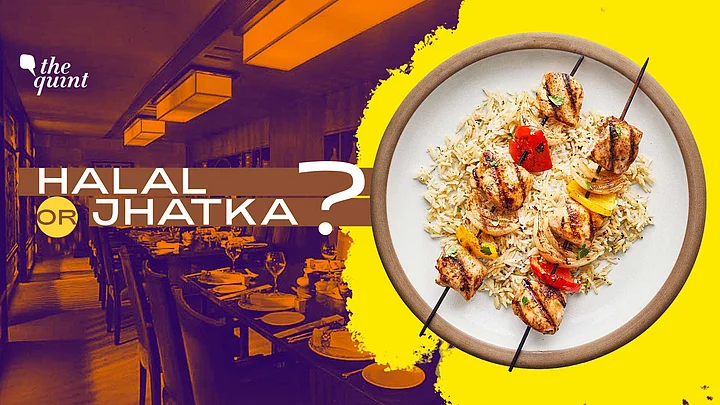The South Delhi Municipal Corporation has cleared a proposal making it mandatory for restaurants to declare whether the meat they are serving is 'halal’ or ‘jhatka’.
“According to Hinduism and Sikhism, eating ‘halal’ meat is forbidden and against religion. Therefore, the committee resolves that this direction be given to restaurants and meat shops where it should be written mandatorily about the meat being sold and served by them that ‘halal’ or ‘jhatka’ meat is available here,” says the resolution passed by the SDMC panel.
There are two ways of looking at this proposal. One, from the perspective of religious beliefs of consumers and the other, from the political point of view.
Religious Beliefs
Now, what is Halal? Halal simply means permissible, and it includes everything that isn't Haraam or prohibited in Islam. It is a much wider concept that goes beyond meat.
The halal method would mean slow slaughter through a cut to the jugular vein, carotid artery and windpipe accompanied by reciting of verses.
For Sikhs, both the slow method of slaughter and the ritual slaughtering of meat are ‘Bajar Kurehit’, or prohibited as per the Rehat Maryada. So, this would include the Muslim and Jew methods and also the Hindu Bali or animal sacrifice, which is not slow, but falls under ritual slaughter.
For Hindus and Christians, there are no clear injunctions on the method of slaughter.
Therefore, if restaurants specify which meat is being used, it would help Sikh, Muslim and Jew consumers avoid what is prohibited to them, respectively.
But this decision also has several political dimensions.
Political Dimensions
The first is the fact that halal is being presented as "prohibited for Hindus" when that's a debatable point.
Meat-eating is a vexed issue within Hindus, among whom there are significant caste- and region-based differences on this matter. The popularly held belief is that Hindus can eat any meat, except that of the cow’s.
Then, some Hindu communities frown upon meat-eating itself. But it is not clear if there is a religious injunction against cutting meat in the halal way, especially as most Hindu religious texts were prepared before knowing about Islam.
There's no Hindu equivalent of the Sikh injunction against meat ritually cut in a slow manner. Therefore, it would be wrong to club Hindus and Sikhs on this matter, as the SDMC has done.
Campaign Against Halal
There’s another angle to this. The decision is being seen as part of Hindutva outfits' campaign against the "Halal economy".
In May 2020, Hindutva outfits like Sanatan Sanstha and Hindu Jagruti carried out a "Boycott halal products" campaign on social media, targeting halal certification given to products. Even Sudarshan TV and BJP MLA from Telangana, T Raja Singh, supported this campaign. One Hindutva publication – Sanatan Prabhat – even called the halal certification as "economic Jihad".
Unlike them, Sikhs have no objection to halal as a concept and only oppose the method of cutting meat. The Quint spoke to several Sikh restaurant owners and meat traders for an earlier story, in which they categorically said that they don’t favour any campaign against halal.
The Hindutva campaign against halal creates space for a larger economic boycott of Muslims and attack on the livelihood of Muslims. It maligns legitimate Muslim meat businesses by linking it with terror, through terms like “economic jihad”. In the past, this issue has also been used to drive a wedge between Muslims and Sikhs.
The SDMC proposal also has the potential of contributing to a campaign against halal meat suppliers.
It is quite possible that at the local level, vigilantes could target Hindu-owned restaurants selling halal meat, pressurising them not to do so.
There's another aspect to this. For some time now, Hindutva outfits have been trying to woo the Dalit Khatik community (traditionally associated with the sale of meat) and communalise their economic competition with Muslims.
So far, the Hindutva outfits' attempts to promote Hindu meat business have only met with limited success, but a large move against halal meat could possibly be aimed at creating demand, which had so far been a problem.
